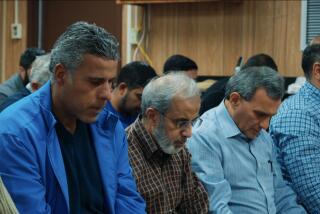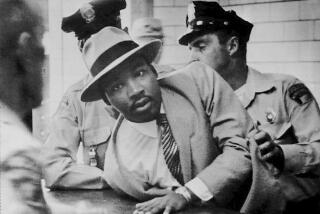A visual, thoughtful examination of Islam
- Share via
Crackpot preacher Jerry Falwell in October called Muhammad -- founder and chief prophet of Islam -- a “terrorist.”
Falwell declared on “60 Minutes” that he’d read enough of Muhammad’s history to know that “he was a violent man, a man of war.” The planet’s most quotable Christian added that “Jesus set the example for love, as did Moses. And I think that Muhammad set an opposite example.”
For the record:
12:00 a.m. Dec. 18, 2002 For The Record
Los Angeles Times Wednesday December 18, 2002 Home Edition Main News Part A Page 2 National Desk 16 inches; 595 words Type of Material: Correction
Muslim photo -- The photo of a 16th century painting that accompanied Howard Rosenberg’s column in Monday’s Calendar mistakenly was printed in reverse, so that the Arabic appeared backward.
An inevitable public outcry forced a tepid apology from Falwell, who said, gee whiz, he’d intended “no disrespect to any sincere, law-abiding Muslim.” And if you believed that ...
Look, Falwell is Falwell, a Beavis-and-Butthead-rolled-into-one whose smiley-face harangues against those he titles “pagans” deliver notoriety and national media to his doorstep. Hadn’t he earlier held “abortionists,” feminists, gays and his other favorite scapegoats partially accountable for the Sept. 11 terrorist attack on the U.S.?
Before his analysis of Muhammad is dismissed entirely, though, it’s appropriate to note, as many have, that most global terrorists appear to be followers of Islam. Can this be a coincidence? If the religion that Muhammad created 1,400 years ago is as peaceful as Muslims and others say it is, why do so many see in it a call to extremism and violence? Just as European fanatics of an earlier age found in Christianity a motivation for the Crusades, the Inquisition and other forms of aggression, persecution and brutality.
That question resonates louder than ever.
So right on cue is the two-hour “Muhammad: Legacy of a Prophet,” a candid, thoughtful, flowing, visually stunning film by Michael Wolfe, Alexander Kronemer and Michael Schwarz that is as timely as documentaries get, even though much of it was shot prior to Sept. 11. It premieres at 9 p.m. Wednesday on KCET-TV.
In addition to charting Muhammad’s life and influence, the film visits mosques and spends time with Americans of Muslim faith, from critical care nurse Najah Bazzy in Dearborn, Mich., to Kevin James, a Brooklyn fire marshal who recalls what entered his mind when he approached Manhattan’s devastated Twin Towers with other firefighters on Sept. 11.
“I just felt ... please, don’t be Muslims doing this.”
Many of the other estimated 7 million Muslims in the U.S. (among 1.2 billion worldwide) probably felt similar anxiety. This film should be of great interest to them. And also to viewers who haven’t read the Koran and are puzzled by the dichotomy in modern Islam whose followers in the main are peaceful and law-abiding, but which has also yielded criminal savagery in its name.
“Islam is really a soft thing, it’s not a hard thing,” artist Mohamed Zakariya says here. “There is absolutely nothing in Islam that justifies the claim of Osama bin Laden, Al Qaeda or other similar groups to kill innocent civilians,” adds M. Cherif Bassiouni, one of many scholars speaking in the film. Acts of terror, he says, “are contrary to Islam.”
Not according to Islamic terrorists, obviously.
Does it all come down to interpretation shaded by current events, just as Falwell and other fundamentalist Christians differ with mainline Christians about the meaning of scripture?
The birth of Islamic scripture is described here with precision and clarity. We learn of Muhammad’s revelation in the mountains outside Mecca when he was squeezed hard by an angel and felt the words of a new scripture in Arabic pouring from his lips. “And Islam had come into being,” says scholar Karen Armstrong.
Years later, Muhammad speaks of another revelation, this one sanctioning self-defense by Muslims persecuted for their religious beliefs. “Killing is abhorrent” in the Koran, Armstrong says. “It’s always wrong to start a war, to be an aggressor. But persecution is worse than killing. When people have been driven from their homes or deprived of their basic human rights, when an evil ideology comes into the world, sometimes, regrettably, it may be necessary to fight and sometimes lives will be lost.”
Aha! The problem, of course, is that one person’s terrorism is another’s noble fight; one person’s religion, another’s “evil ideology.” And echoing an issue underlying U.S. response to Saddam Hussein’s potentially lethal bag of tricks, self-defense to one people may be seen as aggression by the other side.
Did Muhammad’s words promote rampant slaughter? Bassiouni says no, that Muhammad forbade killing of women and children and giving “no quarter” in battle.
Do roots of the anti-Semitism displayed by today’s Islamic terrorists surface in this telling of Muhammad’s story? That’s no easy call for an ordinary viewer. However, we do hear of a pivotal incident in which Muhammad -- whose role as head of state in Medina made him more than a spiritual leader -- approved the execution of Jews he believed betrayed him during a series of bloody battles with Mecca.
“Muhammad had nothing against the Jewish people per se,” Armstrong says. “The Koran continues to tell Muslims to honor the People of the Book, and to honor their religion as authentic.” Muhammad did not want to exterminate Jews, she says, he wanted only to erase “very dangerous internal enemies.”
Bassiouni believes that some Jews twist the meaning of this incident, believing it to be proof that all “Muslims hate the Jews and they kill them,” just as some Muslims see it validating Jews as treacherous. Both are mistaken, he says. As are Falwell and everyone else whose views mirror facile stereotypes, a message this important film delivers again and again.
*
To see it
“Muhammad: Legacy of a Prophet” will be shown at 9 p.m. Wednesday on KCET. PBS’ “Frontline” will rebroadcast the two-hour documentary “Muslims” at 9 p.m. Thursday on KCET.
More to Read
Only good movies
Get the Indie Focus newsletter, Mark Olsen's weekly guide to the world of cinema.
You may occasionally receive promotional content from the Los Angeles Times.








